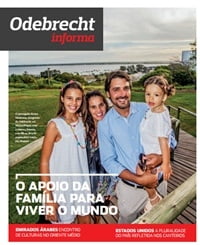Edition 172 – Productive Cycle
His concern with generating income takes into account the sustainable cultivation and preservation of native species
1 de July de 2014
His concern with generating income takes into account the sustainable cultivation and preservation of native species
1 de July de 2014

written by Livia Montenegro
photo by Fernando Vivas
Surrounded by fields of corn, watermelon, cassava and eucalyptus, the Novo Horizonte and Novo Horizonte I farms, located in the municipality of Laje, Bahia, became home to numerous animals. An exuberant scenery, where harpy eagles and other wild species feel safe and welcome.
The described scene was made possible thanks to initiatives such as the recovery of the springs and the implementation of new systems of land use in the two farms – in an amount corresponding to 620 hectares. The Strategic Starch Cooperative (Cooperativa Estratégica do Amido) came up with the idea to restore, recover and preserve the area. “We believe in a sustainable business model that adds productivity and social responsibility,” says Jairo Souza, President of the Cassava Starch Producers Cooperative of the State of Bahia (Cooperativa dos Produtores de Amido de Mandioca do Estado da Bahia – Coopamido).

Founded in 2009, Coopamido consists of over one hundred producers of cassava. Its performance covers seven cities in three regions of Bahia: Valença and Jaguaripe (Southern Bahia), Santo Antônio de Jesus, Sapeaçu, Conceição do Almeida and Castro Alves (the Recôncavo region) and São Miguel das Matas (Jiquiriçá Valley). The cooperative is part of the Development and Growth Integrated with Sustainability Program of the Environmental Protection Areas Mosaic of Southern Bahia (PDCIS), fostered by the Odebrecht Foundation.
Cassava roots delivered by rural producers to Coopamido are processed in a processing industry, where more than 200 tons are milled or processed per day. “The processes involve steps such as washing, crushing, purification and drying,” explains the Industrial Manager, Cristian Konishi. “Starch with high added value is used in industries such as food, cosmetics, oil and gas and pharmaceuticals,” he adds.
In order to encourage the creation of jobs and income, Coopamido has established partnerships with farmers in the region to stimulate them to lend degraded land to local farmers, who use them for growing cassava. “To be benefited, the member of the cooperative must foster environmental actions, such as reforestation and the recovery of springs in the assigned properties,” notes Jairo Souza.

Family income
That was the job opportunity that Roberto Carlos dos Santos, 34, was waiting for. He, who is a resident of the Cruzeiro community in the municipality of Laje, became a member of the cooperative with his wife, Nalva dos Santos, 32. The couple now grows cassava in one of the partner farms. The average monthly family income, which used to be R$ 400, is now over R$ 2,000.
Edson Lobo, 41, is also proud to offer a future for his wife and two children without leaving the field. “Here we are safe and have a better quality of life,” says the Coopamido associate, who receives an income of about R$ 2,000 per month. “My biggest dream is to buy my own land and expand even further our income. This, of course, without ceasing to be a member of the cooperative.”
In synergy with Coopamido, the Institute for Human Promotion of Starch (Instituto de Promoção Humana do Amido – IPHA) has qualified farmers in the region – currently, 30 new grantees are being trained. “Using the most appropriate techniques from planting to harvest, they will also be qualified to undertake activities on their properties,” says Magnólia Santos, Executive Director of the IPHA. By the end of the training process, which lasts one year, producers able to replicate the model of agriculture will be invited to become members.
According to Anselmo Selhorst, Leader of the Strategic Starch Cooperative, it is estimated that over 55 farmers become members until 2016. With the first module of the industry at full capacity, three more will be installed on site. For him, human development will always be linked to the concern and awareness of properly using the natural resources and promoting the recovery of areas. “For our environment to continue surrounded by native species of animals, we have to preserve and apply the necessary techniques to keep them around. Joining the productive, social and environmental sectors provides quality of life, which reflects on human beings.”
Do you wish to be
a partner in our projects, make
a donation or hire our technical consulting?
Send a message
right now!